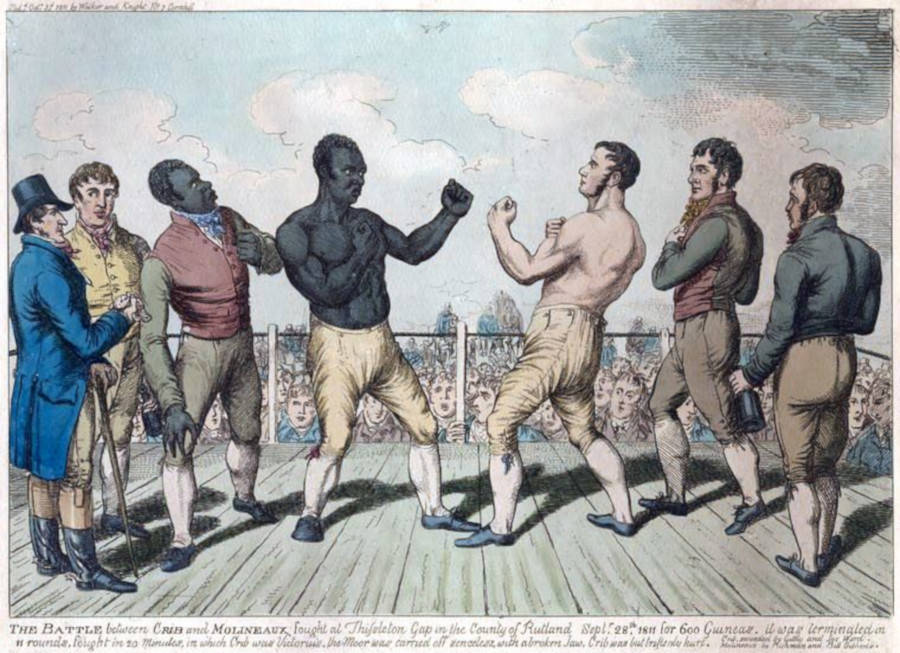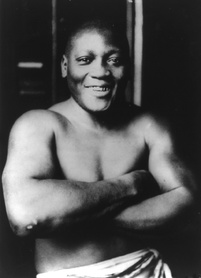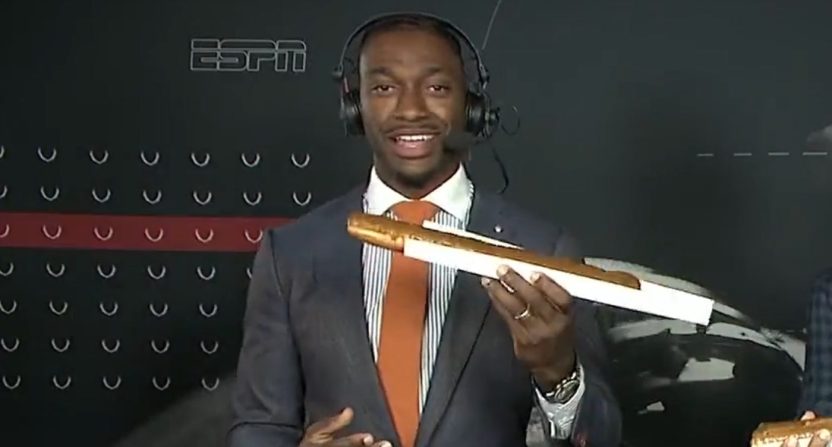FAIR ENOUGH, TOUCHEIf there was no Jim Crow, there wouldn’t be a Jackie Robinson story.
He literally challenged laws, written and unwritten that were meant to disenfranchise black people.
That alone makes it more political.
You are using an out of date browser. It may not display this or other websites correctly.
You should upgrade or use an alternative browser.
You should upgrade or use an alternative browser.
Robert Griffin III: Jackie Robinson breaking color barrier not political
- Thread starter Bar Razor
- Start date
More options
Who Replied?get these nets
Veteran
2 reasonsWhy don't Jack Johnson get any credit for breaking color barrier in sports (even though George Dixon did it in 1890 winning the first world Bantamweight title)
1)Organized sports league owners colluded to stop signing Black players or playing Black teams. Dont think boxing had a recognized domestic organizing body.
2) Black boxers fought white boxers before 1890
Those men you mentioned broke sports barriers, and should get recognition , but the timing of Robinson's signing played a large part of why it was significant. What was happening in America at the time.
It wasn't.
Societal Change isn't (always) beholden to political parties/contexts.
For instance, Gun Safety isn't political. Gun RIGHTS are. Hiring and firing at a private employer (like a sports team) is not inherently political. The laws that govern said hiring and firing are.
So I get his point. We can't let modern political definitions taint our history. This is how the right can be fascist and people can fall into it. Because the modern definition of a fascist (to most idiots) is a Hugo Boss uniform, Jackboot wearing German. If you aren't THAT then you aren't fascist.
I would have worded it differently though. People can't contextualize headlines.
Societal Change isn't (always) beholden to political parties/contexts.
For instance, Gun Safety isn't political. Gun RIGHTS are. Hiring and firing at a private employer (like a sports team) is not inherently political. The laws that govern said hiring and firing are.
So I get his point. We can't let modern political definitions taint our history. This is how the right can be fascist and people can fall into it. Because the modern definition of a fascist (to most idiots) is a Hugo Boss uniform, Jackboot wearing German. If you aren't THAT then you aren't fascist.
I would have worded it differently though. People can't contextualize headlines.
NOSaintsFan02
Superstar
The crazy thing is Parker got fired for this. He says this on First Take today and ESPN is probably promoting him lmao
2 Up 2 Down
Veteran
1) promoters blocked it and the fighters draw a race line2 reasons
1)Organized sports league owners colluded to stop signing Black players or playing Black teams. Dont think boxing had a recognized domestic organizing body.
2) Black boxers fought white boxers before 1890
Those men you mentioned broke sports barriers, and should get recognition , but the timing of Robinson's signing played a large part of why it was significant. What was happening in America at the time.
2) only one black fighter fought for a title prior and that was Tom Molineaux in 1830s
Ima always love how “Making a Statement” is right in the corner too

Give Rob his job back

get these nets
Veteran
1) promoters blocked it and the fighters draw a race line
2) only one black fighter fought for a title prior and that was Tom Molineaux in 1830s
I said that Black boxers fought whites ahead of 1890. The man you just mentioned is depicted in this drawing, along with his manager, a former boxer named Bill Richmond.

Tom Cribb versus Thomas Molineaux in 1811. Richmond is standing behind Molineaux

From Slave To Star: How Bill Richmond Fought For His Freedom To Become The Original Muhammad Ali
Richmond didn't become a professional boxer until he was in his 40s and he won matches into his 50s against opponents 20 years his junior.
2 Up 2 Down
Veteran
I know about that. Fighting a white person didn't mean anything. Fighting for a championship was something as boxing was one of the most popular sports in the world in the 1800s and early 1900s. White men being champions in a physical sport was to show the dominance of white men.I said that Black boxers fought whites ahead of 1890. The man you just mentioned is depicted in this drawing, along with his manager, a former boxer named Bill Richmond.

Tom Cribb versus Thomas Molineaux in 1811. Richmond is standing behind Molineaux

From Slave To Star: How Bill Richmond Fought For His Freedom To Become The Original Muhammad Ali
Richmond didn't become a professional boxer until he was in his 40s and he won matches into his 50s against opponents 20 years his junior.allthatsinteresting.com
Richmond didn't fight for the Cribb's title as he won it after beating Richmond. Also that was the English title.
In America, a black man didn't fight for it (Heavyweight title) until Johnson fought Tommy Burns and really that fight had to be held in Australia. It wasn't until his next fight did we have a black Heavyweight champion on our soil.
get these nets
Veteran
You made the comparison to baseball. I said that organized league teams colluded to not sign Black players or play against Black teams.I know about that. Fighting a white person didn't mean anything. Fighting for a championship was something as boxing was one of the most popular sports in the world in the 1800s and early 1900s. White men being champions in a physical sport was to show the dominance of white men.
Richmond didn't fight for the Cribb's title as he won it after beating Richmond. Also that was the English title.
In America, a black man didn't fight for it (Heavyweight title) until Johnson fought Tommy Burns and really that fight had to be held in Australia. It wasn't until his next fight did we have a black Heavyweight champion on our soil.
I asked whether there was an organized body that governed boxing.
You wrote that promoters and boxers blocked fights and drew a color line against Black boxers.
I pointed out previous instances of Black boxers crossing this color line ahead of 1890.
What was the point of asking the question about the boxers? It was straightforward question, and I think I gave a straightforward reply about the difference between the sports and the context of Mr. Robinson beingvsigned and called up to the majors.
2 Up 2 Down
Veteran
Promoters make a very loose governing body.You made the comparison to baseball. I said that organized league teams colluded to not sign Black players or play against Black teams.
I asked whether there was an organized body that governed boxing.
You wrote that promoters and boxers blocked fights and drew a color line against Black boxers.
I pointed out previous instances of Black boxers crossing this color line ahead of 1890.
What was the point of asking the question about the boxers? It was straightforward question, and I think I gave a straightforward reply about the difference between the sports and the context of Mr. Robinson beingvsigned and called up to the majors.
Champions and promoters of the champions drew the color line.
Only one in that happened before Dixon happened for the English title that was completely separate from what was happening in America where boxing was just starting to get off the ground. Once boxing started taking off in America, black fighters could only fight for the Negro/Colored title (Negro Leagues), fighting for the World title (Majors), at least in America, was whites only. George Dixon broke it but him being a bantam/feather people (Americans) didn't give it as much prestige as Middle, Light Heavy, and definitely not Heavyweight which is the premier.
You may not think Johnson broke the color barrier but many do. Even moreso back when it happened

Hard Road to Glory Moments: Remembering Jack Johnson | Arthur Ashe Legacy
Before Jackie Robinson broke the color barrier in baseball, another Jack broke the color barrier in boxing. Jack Johnson, cited by Arthur Ashe as one of “the most famous people on this earth in his…
It must be remembered that professional and amateur sports emerged as a significant presence in American cultural life at the end of Reconstruction (1877) and developed throughout the age of racial segregation in America, which culminated in the 1896 Supreme Court decision, Plessy v. Ferguson that declared that Jim Crow laws and state-sponsored racial segregation were not unconstitutional. It was, moreover, in the 1890s, the era of white imperialism: so-called Anglo-Saxon dominance over the "lesser breeds" and the "colored races" was seen as inevitable. The United States became, as a result of the Spanish American War of 1898 a true imperial power, claiming control of the Philippines, Cuba, Puerto Rico, and Hawaiiall non-white nations whose occupants were seen as inferior by most white Americans. This, coupled with legislation abolishing Asian or "Oriental" immigration and the rampant belief in Social Darwinism or the superiority of the white race over others in the competition for world domination led to probably the most virulently racist period in post-Civil War American history. What is surprising is not that Jack Johnson, considering his times, should have had his ultimate downfall but that he was ever able to rise to the point where he was able to challenge for the heavyweight title in the first place.
Blacks were subjected to a harsh, abject system of racial segregation and second-class citizenship that was often backed up by lynching and white-instigated race riots where scores of blacks were killed. Clearly, during these years, neither the public, nor its leaders, were much interested in seeing any sort of race mixing or even the hint of it. From the time that Sullivan held the title until Jim Jeffries, who was champion from 1899-1905, no white heavyweight champion would even consider fighting a black, although there were many highly skilled black heavyweights at the time, most notably Peter Jackson. Other very good black heavyweights who were Jack Johnson's contemporaries include Sam McVey, Sam Langford, Joe Jeanette and Denver Ed Martin. Most of the time black heavyweights had to fight each other. Sometimes, when they fought whites (in virtually the entire South, mixed race fights were illegal), it was expected that the blacks would lose or else the fight would be declared "no decision"—in other words, a draw. It was when Jeffries retired as champion in 1905 and tried to engineer a successor that a chain of events were set in motion that eventually permitted Johnson to fight for and win the title.
Last edited:
This is stupid. Jackie Robinson breaking the color barrier was absolutely political, because it was a direct challenge to a political system built on segregation. You can't ignore that the barriers he faced were being upheld by laws and policies, and the resistance to integrating baseball wasn't just from fans, but from politicians and institutions, too. Stop trying to sanitize Black history to justify its erasure.
great post
TheKongoEmpire
The First Men
I think that's an aspect some black parents truly failed to understand. Come hell or high water, I refuse to have and raise my children in either a white or any non-black community. I can't speak for any parents on this board but if there's any possibility that my children could become a c00ns, I'd rather not have any.Every brother doesn't have to be a Panther, but I truly wonder what happens in the upbringing of someone like this to cause them to end up this way.

